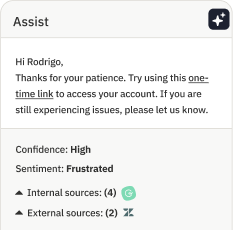What is the difference between BPO and call centers?

In the world of customer service and support, businesses are constantly striving to streamline their processes and provide exceptional experiences to their customers. As organizations explore different solutions to improve their operations, they often come across the terms "business process outsourcing" (BPO) and "call center." While these terms may seem similar, they actually have distinct differences in their functions and applications. In this article, we will explore what BPO is, what a call center entails, and the key differences between the two. We will also discuss the benefits of each and how Assembled, a leading workforce management platform, can help effectively manage both in-house and BPO teams.
Understanding BPO
Business process outsourcing (BPO) is a practice where companies contract specific tasks or entire departments to third-party service providers. These providers, known as BPO call centers, handle a range of activities, including inbound and outbound customer calls, market research, telemarketing, help desk services, technical support, lead generation, and sales. BPO agents undergo extensive training to ensure they have a deep understanding of their clients' products and services, allowing them to provide high-quality customer support.
One of the primary advantages of BPO is that companies can leverage the expertise and resources of external service providers, rather than building and maintaining their own support teams in-house. BPO allows businesses to scale their customer service operations quickly, increase efficiency, and reduce costs. By outsourcing non-core functions, organizations can focus on their core competencies and strategic goals.
The role of a call center
A call center, on the other hand, focuses on handling inbound and outbound communication with customers. Traditionally, call centers were primarily associated with telephone conversations, but as communication channels have evolved, they now manage interactions across various channels, including phone calls, emails, chat, SMS, and social media. The term "contact center" is often used to reflect this expanded scope.
Call centers can be either in-house, meaning they are operated by the company itself, or outsourced to a third-party service provider. In-house call centers are integrated within the company's operations and are staffed by employees who work exclusively for that organization. Outsourced call centers, on the other hand, are separate entities that handle customer interactions on behalf of multiple companies. To decide whether to scale in-house or go the BPO route, you need to know specific characteristics that distinguish BPO and call centers.
Key differences between BPO and call centers
While BPO and call centers are related concepts, there are several key distinctions between the two:
- Scope of services: BPO encompasses a broader range of activities, including both customer-facing and behind-the-scenes tasks, such as accounting, HR, marketing, and sales. Call centers, however, primarily focus on customer communication and support.
- Ownership and integration: BPO services are generally outsourced to external service providers, who operate independently from the client organization. In contrast, call centers can be either in-house or outsourced, with in-house call centers being fully integrated within the company's operations.
- Flexibility and scalability: BPO offers greater flexibility and scalability, as companies can easily adjust the scope and scale of outsourced services based on their needs. Call centers, especially in-house ones, may have limitations in terms of scalability and may require significant investments in infrastructure and resources.
- Expertise and specialization: BPO providers often specialize in specific industries or functions, allowing them to offer specialized expertise and resources. Call centers, whether in-house or outsourced, may have varying levels of expertise depending on the training and capabilities of their agents.
- Cost structure: BPO services are typically priced based on the specific tasks or services provided, allowing companies to have more control over their costs. Call centers, particularly outsourced ones, often have a cost structure based on factors such as call volume or agent hour

Benefits of BPO and call centers
Both BPO and call centers offer significant benefits to businesses:
Benefits of BPO:
- Cost savings: Outsourcing non-core functions to BPO providers can result in significant cost savings, as companies can avoid the expenses associated with building and maintaining in-house teams, such as hiring, training, and infrastructure costs.
- Scalability: BPO services provide the flexibility to scale operations up or down quickly, allowing companies to adapt to changing business needs and market conditions.
- Access to expertise: BPO providers often have specialized knowledge and resources in specific industries or functions, allowing companies to leverage their expertise and benefit from best practices.
Benefits of call centers:
- Enhanced customer experience: Call centers focus specifically on customer communication and support, enabling businesses to provide timely and efficient assistance to their customers, enhancing their overall experience.
- 24×7 availability: Many call centers offer round-the-clock support, ensuring that customers can reach out for assistance at any time, thereby improving customer satisfaction and loyalty.
- Multichannel support: Call centers, especially contact centers, are equipped to handle customer interactions across multiple communication channels, providing a seamless omnichannel experience.
Leveraging Assembled for effective workforce management
Managing both in-house and BPO teams can be a complex task, but with the right tools and solutions, it can be streamlined and optimized. Assembled, a leading workforce management platform, offers a comprehensive suite of features and functionalities to help businesses effectively manage their customer support operations.
Assembled's platform provides solutions for scheduling at scale, short-term forecasting, real-time management, performance management, vendor management, metrics management, back-office management, quality assurance, and integrations. By utilizing Assembled's platform, businesses can efficiently allocate resources, monitor performance, and ensure seamless coordination between in-house and BPO teams.
While BPO and call centers share some similarities, they have distinct differences in terms of scope, ownership, integration, and specialization. BPO offers a broader range of outsourcing options, including customer-facing and behind-the-scenes tasks, while call centers primarily focus on customer communication and support. Both BPO and call centers provide significant benefits to businesses, such as cost savings, scalability, and enhanced customer experience. To effectively manage in-house and BPO teams, businesses can leverage Assembled's powerful workforce management platform.





